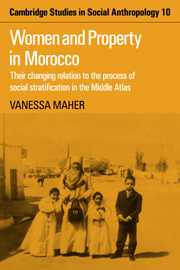 Women and Property in Morocco
Women and Property in Morocco Published online by Cambridge University Press: 27 October 2009
The discussion of property-holding reveals that the majority of the population owns very little. Their plots of land are too small to provide them with subsistence, let alone with a surplus to sell for cash, which they need to pay taxes and to buy consumer goods, such as sugar, tea, clothes and paraffin. It is difficult to find a way of supplementing this meagre income within the market economy for jobs are scarce, and a minimum of capital is needed to trade. Those categories of the population such as small-holders, southern migrants, and women who cannot get a living within the market economy, must fall back on extra-market relationships.
These are of two kinds, those entailing obligations of mutual help, and those predicting a political relationship of subordination and dependence. The first is specific to members of a ‘tribal’ orc ‘lineage’ community, who must have rights in lineage property to qualify as such. The fact that support is available from this source goes some way towards explaining why there is such resistance to selling land. The second type of extra-market relationship is the patron-client relationship which provides for the patron's dispensation of goods and protection in exchange for the client's performance of various services; although the distributing of wealth and the command of services is no longer so closely associated with the estate system, the latter is clearly still relevant.
To save this book to your Kindle, first ensure [email protected] is added to your Approved Personal Document E-mail List under your Personal Document Settings on the Manage Your Content and Devices page of your Amazon account. Then enter the ‘name’ part of your Kindle email address below. Find out more about saving to your Kindle.
Note you can select to save to either the @free.kindle.com or @kindle.com variations. ‘@free.kindle.com’ emails are free but can only be saved to your device when it is connected to wi-fi. ‘@kindle.com’ emails can be delivered even when you are not connected to wi-fi, but note that service fees apply.
Find out more about the Kindle Personal Document Service.
To save content items to your account, please confirm that you agree to abide by our usage policies. If this is the first time you use this feature, you will be asked to authorise Cambridge Core to connect with your account. Find out more about saving content to Dropbox.
To save content items to your account, please confirm that you agree to abide by our usage policies. If this is the first time you use this feature, you will be asked to authorise Cambridge Core to connect with your account. Find out more about saving content to Google Drive.